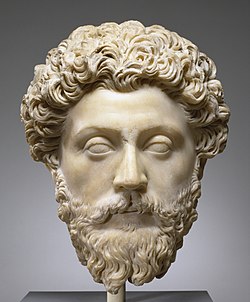Physical Address
304 North Cardinal St.
Dorchester Center, MA 02124
We independently evaluate and recommend products we believe will benefit our readers. If you purchase through links on this page, we may earn a commission.
Written By:

Published On: August 19, 2025
Last Updated On: January 3, 2026
Reviewed By:


Happiness often feels like something we have to chase—through achievements, possessions, or recognition. Yet, when we finally reach those milestones, the feeling is usually temporary. Marcus Aurelius, one of history’s wisest leaders, faced this truth centuries ago while carrying the heavy responsibility of ruling Rome. Despite his power, he turned inward, reminding himself daily that peace and happiness are not found in external things, but in how we live and think each day.
What makes his reflections timeless is how human they are. He didn’t write his Meditations to impress others; he wrote them as private reminders—notes to himself on how to stay calm, kind, and grounded [1]Marcus Aurelius, Meditations. That honesty is what makes his wisdom so relatable to us today.
In this article, we’ll explore five Marcus Aurelius habits that can guide us toward a happier life. These are not abstract ideas, but practical ways of living—habits that anyone can practice in their own quiet moments.
Marcus Aurelius didn’t live in an easy world. He faced wars, loss, betrayal, and the weight of leading an empire. Yet, in his writings, he constantly reminded himself to return to the simple truths that bring peace. These reminders—written not as public speeches but as private notes—show us habits anyone can practice, regardless of time or place.
Let’s look at five habits inspired by Marcus Aurelius that can help us cultivate a calmer, more meaningful, and happier life today.
Marcus Aurelius often reminded himself that simply waking up was a gift, a chance to live with virtue once more. Instead of rushing into the day or being consumed by worries, he paused to reflect on life itself.
He wrote:
“When you arise in the morning, think of what a precious privilege it is to be alive–to breathe, to think, to enjoy, to love.”
This simple act of reflection changes how we begin the day. Instead of letting external pressures take control, we remind ourselves of what truly matters. A short pause in the morning—whether through journaling, prayer, or silent gratitude—can help set the tone for a calmer, more purposeful day.
How you can practice it:
Before checking your phone or diving into tasks, take two minutes to breathe and reflect. Ask yourself: “What kind of person do I want to be today?”
Much of our unhappiness comes from wrestling with things far beyond our influence—what others think of us, the state of the world, or even small inconveniences in daily life. Marcus Aurelius constantly reminded himself to separate what was within his control from what was not.
He wrote:
“You have power over your mind, not outside events. Realize this, and you will find strength.”
This truth is simple yet liberating. We can’t dictate how others behave, but we can choose how we respond. We can’t stop challenges from arriving, but we can decide whether to face them with patience or with frustration.
How you can practice it:
When something troubles you, pause and ask: “Is this within my control?” If the answer is no, let it go. If yes, act calmly on what you can change. Over time, this habit creates resilience and frees the mind from needless worry.
Marcus Aurelius lived with immense responsibilities, yet he often reminded himself to pause and appreciate the beauty of life. Gratitude, for him, was not just a fleeting feeling but a habit that helped him remain grounded even in difficult times.
He reflected:
“Dwell on the beauty of life. Watch the stars, and see yourself running with them.”
By turning our attention to what we already have—our breath, relationships, nature around us—we shift from a mindset of lack to one of abundance. Gratitude softens the restlessness of always wanting more and replaces it with peace in the present moment.
How you can practice it:
Before going to bed, write down three small things you’re grateful for from the day. They don’t need to be grand—sometimes a smile from a stranger, a good meal, or a quiet moment is enough. With time, this practice reshapes how you see your life.
Life tested Marcus Aurelius in countless ways—illness, political unrest, betrayal, and personal loss. Yet through it all, he reminded himself that suffering comes less from the events themselves and more from how we interpret them.
He wrote:
“If you are distressed by anything external, the pain is not due to the thing itself, but to your estimate of it; and this you have the power to revoke at any moment.”
This perspective doesn’t deny pain—it teaches us to face it with courage and calm. Instead of asking, “Why me?” Marcus would ask, “How can I respond well to this?” By shifting the question, even hardship becomes an opportunity for strength.
How you can practice it:
When you face a challenge, pause and reframe it. Ask yourself: “Is this situation shaping me into someone stronger, wiser, or more patient?” This mindset doesn’t erase difficulty, but it gives meaning to it.
For Marcus Aurelius, happiness was never about excess or outward show. Despite being emperor, he valued honesty, humility, and simplicity above wealth or fame. To him, living well meant living in alignment with one’s values and avoiding unnecessary distractions.
He advised:
“Waste no more time arguing about what a good man should be. Be one.”
Integrity brings peace because we no longer live in conflict with ourselves. And simplicity frees the mind from the endless chase for more, allowing us to enjoy life as it is. In a noisy world full of temptations, these two qualities are the foundation of lasting happiness.
How you can practice it:
Reflect on your daily choices—are they aligned with your values, or with what others expect? Start small: simplify one area of your life, whether it’s your schedule, possessions, or habits, and notice the calm it creates.
Marcus Aurelius never set out to become a teacher of happiness. His Meditations were simply reminders to himself—gentle notes on how to stay calm, live with virtue, and find meaning in an uncertain world. Yet those reminders, written nearly two thousand years ago, still speak to us today.
His habits—beginning the day with reflection, focusing on what we can control, practicing gratitude, accepting hardship with calm, and living with integrity and simplicity—are timeless guides for anyone seeking peace in modern life.
Happiness, as Marcus shows us, is not about chasing what lies outside, but about cultivating strength, gratitude, and purpose within.
Try adopting even one of these habits this week. Notice how it shifts your perspective. Over time, small daily practices can transform not just how you feel, but how you live.
A calm mind, a grateful heart, and honest actions—these are the true treasures of life.
 — Marcus Aurelius
— Marcus AureliusRead Next: Stoicism for Daily Stress Relief: 5 Simple Techniques to Stay Calm
Stoic Thinker
Nitin Yadav, Editorial Director and Review Board Member at Wellup Life, is a Stoic thinker who inspires personal growth through resilience, discipline, and clarity.

Reviewed By:


Reviewed By:


Reviewed By:


Reviewed By:


Reviewed By:


Reviewed By:


Reviewed By:

Wellup Life is your space for personal growth, wellness, and mindful living. From self-improvement and productivity to spirituality and relationships, we share practical insights and timeless wisdom to help you live with clarity, balance, and purpose.
Copyright © 2024 – Wellup Life — All rights reserved
